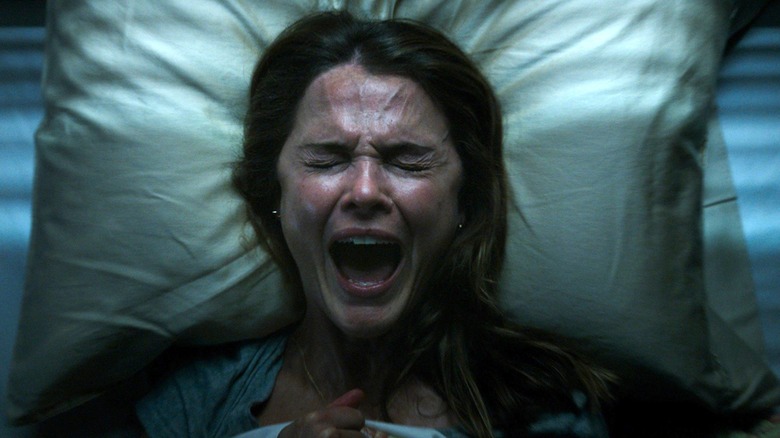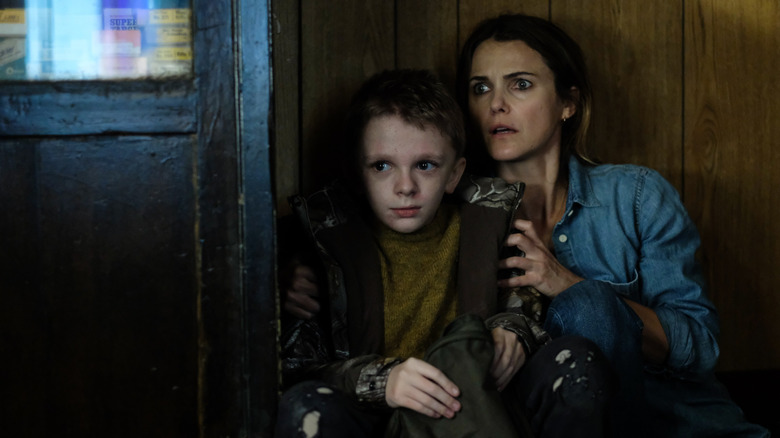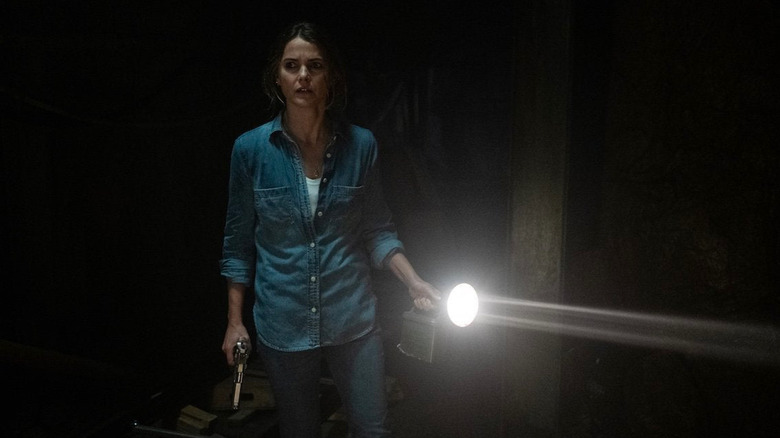Antlers Review: Terror In A Small Town
There are levels to horror stories, and the ways in which they impact you as a viewer or a reader. Depending on the subgenre, the tone, and the overall approach, horror can land a blow to your head, your heart, or your gut, and the trick is to deliver a story that eventually gets to all three. A rapid-fire horror-comedy might not seem like it's hitting your heart right away, but you'll get that feeling on the way home from the theater. A slow-burn emotional horror story might not go for the gut at first, then wrench a little gore in there right when your guard is down. It's all about finding the right balance of elements, picking your moments, and delivering on them.
Every solid horror film will, one way or another, get around to hitting the trinity of head, heart, and gut, but it's rare that a film manages to do all three, all at once, with the same level of craft and impact. It's a particularly difficult hat trick to pull off, but when it happens it arrives with devastating, instantly memorable gravity. "Antlers," the new horror film from director Scott Cooper, pulls it off with energy, with atmosphere, and with powerful performances to drive home its heavy, strikingly effective scares. Announced way back in 2018 and originally scheduled to hit theaters 18 months ago, "Antlers" turned out to be a film that was very much worth the wait, delivering sleep-with-the-lights-on terror just in time for Halloween.
Atmospheric fear
After a deeply unsettling prologue that helps set the tone and establish the film's central mythology, "Antlers" plunges headlong into parallel narratives of darkness centering on two very different people in the same Oregon town. On one side, there's Julia (Keri Russell), a schoolteacher who's recently returned home to live with her brother, local sheriff Paul (Jesse Plemons), and taken a job at the local school. Julia spent years away from her hometown, and from Paul, thanks to childhood trauma centered on their father, whose memory lingers in the house and in Julia's mind not unlike a ghost.
Perhaps because her memories of her father's abuse are still so fresh, Julia is able to see similar tendencies in other people, particularly Lucas (Jeremy T. Thomas), a quiet student who sits at the back of her class creating unsettling drawings that hint at something dark in his home life. After hearing one of Lucas' stories in class, Julia tries to dig deeper, and finds the boy puts up emotional walls around whatever might be going on. When we, the audience, follow Lucas home, we see that he's hiding something that goes far beyond parental abuse. Something is living in Lucas' attic, something that was once a family member but has become something else, something Lucas has locked away from the world to protect it as well as the people in the town. The closer Julia gets to the truth, the more she learns that while some monsters are human, others can grow into something beyond.
The script — by Cooper, C. Henry Chaisson, and Nick Antosca (who wrote the short story on which the film is based) — immediately sets up this duality by immersing Julia and Lucas in their own respective slow-burn nightmares. Julia looks inward for her monsters, while Lucas looks outward, but they're both tormented in their own way, and they recognize that mutual sense of torment in each other, even if they're not entirely ready to admit it. There's an immediate ember of dread there that helps build a tremendous sense of atmosphere to carry "Antlers" through its entire runtime, and that's before you get to the finer points of the monster that will ultimately stalk through the lives of every character in the piece.
Creature feature
Even when the metaphors are hidden under thick layers of blood and gore, the best monsters are always a metaphor for something, and the monster in "Antlers" is no different. Cooper is well aware that the creature stalking this small, misty Oregon town is an avatar for human suffering, the ways in which we eat our own, the ways in which certain socioeconomic systems can devour people from within, and so on. One scene in particular lays the metaphor out flat for all to see, but most of the time "Antlers" succeeds in playing an intricate game of obfuscation, only showing us just enough of its creature to keep us hooked. It's a delicate, often deceptively subtle dance that slowly ratchets up the film's tension to great effect.
Which isn't to say you have to wait all that long to get a taste of the monstrous in this film. "Antlers" definitely has more than one moment in which more weak-stomached viewers might be watching from behind their fingers, and when you finally do catch hints of the monster in all its glory, it's spectacular to behold (Guillermo del Toro, one of the most gifted monster makers working in film right now, is an executive producer), but like so many great creature features, there's a less-is-more approach. Instead of giving you moment after moment of stomach-churning brutality, Cooper's approach to crafting terror makes you more terrified of a single, guttural sound than any actual visual.
But even beyond the monster design, and the ways in which "Antlers" slowly integrates its more monstrous elements into the story, there's an underlying terror that serves the film well even after its credits have rolled. The violence will get you in the gut, and the metaphors will get you in the head, but it's the part of the story that aims for your heart that lives longest in your memory. "Antlers" is terrifying not just because of the overt horror elements, but because of the quiet pain that each of its main characters bears. This is a heavy horror film that doesn't avert its eyes, that keeps focus on the emotional toll of the narrative right up until its unforgettable ending. That sense of unflinching devotion to its intimate, often nerve-shattering narrative makes it deeply compelling, and helps it stand as one of the year's best horror films.


